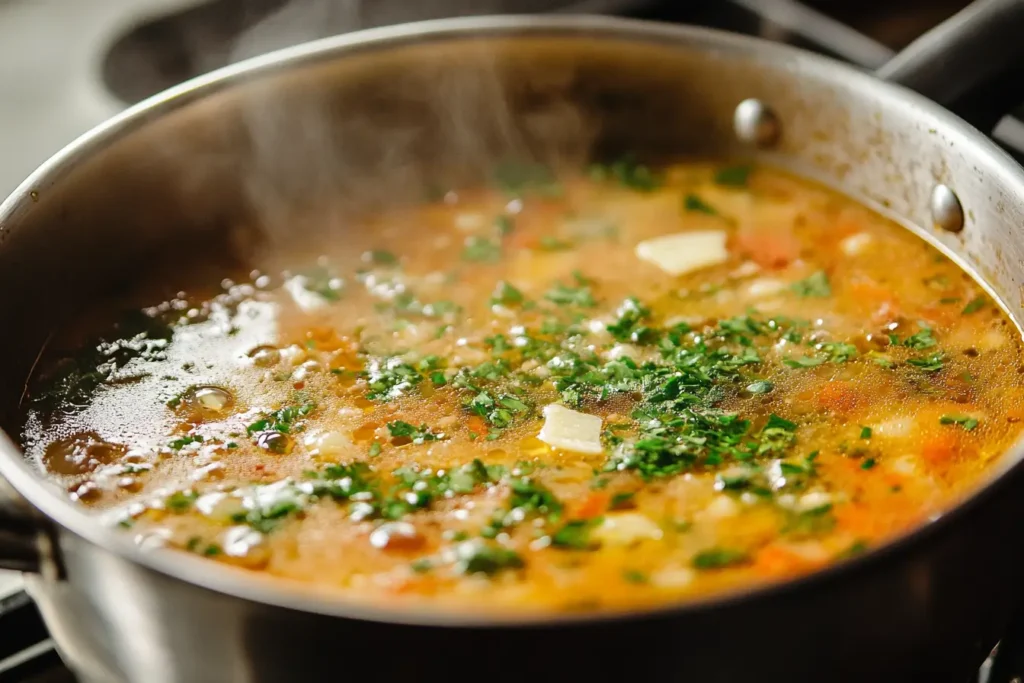Why Is It Important to Know the Secret Ingredient in Soup?
Soups and stews hold a special place in culinary traditions around the world. Whether you’re simmering a pot of hearty vegetable soup on a winter day or preparing a light broth for a quick meal, these dishes have the power to comfort and nourish. But what is the secret ingredient in soup that truly makes it unforgettable? Often, it’s a seemingly small addition—like a splash of vinegar or a Parmesan rind—that transforms flavors and elevates your dish from ordinary to extraordinary. In this article, we’ll explore the hidden gems that can take your soups and stews to the next level. Learn how ham bones add a rich depth of flavor to soups and broths.
The secret ingredient can transform your soup from bland to flavorful.
From professional chefs to home cooks, everyone has their own secret weapon, whether it’s a splash of vinegar, a Parmesan rind, or a pinch of turmeric. In this article, we’re diving into the world of secret soup ingredients, exploring how they work and why they’ve become indispensable for anyone who loves creating magic in a pot. Discover how unique ingredients can transform simple vegetable soups into gourmet dishes.
For instance, some cooks swear by using pumpkin to add natural thickness and subtle sweetness to their soups. Discover how pumpkin leaves can enhance the texture and flavor of soups. Meanwhile, others prefer using burned onions or carrots to bring a caramelized, smoky flavor to their broths. These little tricks can make all the difference, especially when crafting hearty dishes like Black Bean Soup or adding a refreshing twist with Thai Coconut Curry Chicken.
Find out how simple additions like vinegar or Parmesan can elevate your soup.
Common Challenges in Soup-Making and Their Secret Solutions
A well-made soup is a symphony of flavors, but achieving that balance isn’t always easy. Many soups end up tasting flat or bland, leaving you searching for something to make them more exciting. This is where the idea of a secret ingredient comes in. What is the secret ingredient in soup that home cooks and chefs swear by? It’s often something unexpected—an ingredient that enhances the dish without overpowering it. For example, adding a splash of vinegar can brighten the flavors, while a Parmesan rind simmered in the broth brings a savory depth. These small additions can make all the difference, ensuring your soup has the perfect harmony of taste, aroma, and texture. As soups have become more creative, secret ingredients have taken center stage, inspiring cooks everywhere to experiment and push boundaries in their kitchens.
The Struggle for Depth and Richness
One of the most common complaints about homemade soups is their lack of depth. Have you ever tasted a soup that felt like it was missing something? This is a familiar challenge for many cooks. What is the secret ingredient in soup that can solve this problem? The answer often lies in umami-rich additions. Umami, the savory “fifth taste,” is what gives dishes their satisfying richness. Anchovies, soy sauce, or fish sauce are fantastic examples of umami boosters that can add complexity to your soup.
Adding just a teaspoon or two can completely transform your dish. Anchovies, for instance, dissolve into the broth, leaving behind a subtle, savory flavor that’s hard to identify but impossible to ignore. Similarly, soy sauce adds a deep, salty richness that pairs perfectly with vegetable or beef soups. When you want to make your soup more robust, think about how you can incorporate these umami-rich ingredients.
Texture Troubles and Solutions
Another common challenge is achieving the right texture. Watery soups can feel unsatisfying, while overly thick soups might seem heavy. So, what is the secret ingredient in soup to strike the perfect balance? Natural thickeners like pumpkin, potatoes, and beans are excellent options. For instance, pumpkin puree adds body to soups while also imparting a slightly sweet flavor. This is especially useful in vegetable-based soups where you want to create a creamy consistency without using dairy.
Potatoes, when cooked and blended, can act as a natural thickener, giving your soup a velvety texture. Similarly, beans like cannellini or black beans can be pureed to create a hearty base. Another surprising addition is carrot juice, which not only thickens the soup but also adds a subtle sweetness that balances acidic ingredients like tomatoes. These natural thickeners are easy to use and can elevate your soup to a gourmet level without much effort.
Achieving the Perfect Aroma
The aroma of soup is often the first thing that entices you to take a bite. But how do you make your soup smell as good as it tastes? What is the secret ingredient in soup that boosts its aroma? Burned onions and carrots are an excellent place to start. By charring these vegetables before adding them to the soup, you can create a smoky, caramelized aroma that permeates the entire dish. This technique is particularly effective in broths and vegetable-based soups. Another option is to use whole spices like cloves, cumin, or star anise. Adding these spices during the simmering process allows their flavors to infuse the broth, creating a warm, inviting scent. For those looking to experiment, ingredients like Sichuan peppercorns can add a unique, citrusy aroma that pairs well with chicken or pork-based soups.
Vinegar: The Unexpected Hero

Vinegar is one of the most versatile secret ingredients you can add to soup. What is the secret ingredient in soup that brightens flavors and balances richness? A splash of vinegar is often the answer. Different types of vinegar work well in different soups, so it’s worth experimenting to find the right match. Apple cider vinegar is a popular choice for vegetable soups, adding a tangy note that complements earthy flavors. Balsamic vinegar works beautifully in tomato-based soups, enhancing their natural sweetness and acidity. Rice vinegar, on the other hand, is perfect for Asian-inspired broths, lending a subtle tang that ties the flavors together. For an even bolder approach, try using spicy vinegars like Tabasco for an extra kick. Adding vinegar at the end of the cooking process ensures its brightness remains intact, giving your soup a fresh, vibrant finish.
Parmesan Rinds: A Cheesy Surprise

If you’re a fan of cheesy flavors, Parmesan rinds might be your new favorite secret ingredient. What is the secret ingredient in soup that adds a savory depth without overwhelming the dish? Parmesan rinds fit the bill perfectly. When simmered in soup, they release their rich, nutty flavor, transforming a basic broth into something extraordinary. These are particularly effective in minestrone, chicken noodle soup, and bean-based soups. To use Parmesan rinds, simply toss them into your pot while the soup is cooking and let them simmer for at least 30 minutes. The result is a subtle yet distinctive flavor that will leave everyone guessing your secret.
Burned Onions and Carrots

Burned onions and carrots might sound unconventional, but they are a fantastic way to add complexity to your soup. What is the secret ingredient in soup that brings smoky sweetness to the broth? Charring vegetables is a simple technique that delivers big results. To make burned onions and carrots, simply roast or sear them until they develop a deep brown color. These caramelized veggies can then be added directly to the soup pot, where they infuse the broth with a rich, umami-rich flavor. This method works particularly well in clear broths and vegetable-based soups, where the smokiness can shine through.
Anchovies or Fish Sauce for Umami
When it comes to umami, anchovies and fish sauce are two of the most powerful tools in your kitchen. What is the secret ingredient in soup that gives it a savory kick? These ingredients pack a punch of flavor with just a small amount. A teaspoon of fish sauce, for example, can add a salty, umami depth to chicken soup, while anchovies dissolve seamlessly into the broth, leaving no trace of their fishy origin. These ingredients are particularly useful in soups where you want to enhance the savory elements without adding extra salt.
Turmeric: A Golden Boost
Turmeric is not just for curries—it’s also a fantastic addition to soups. What is the secret ingredient in soup that adds both flavor and color? Turmeric provides a warm, peppery taste and a vibrant golden hue that makes any soup more inviting. To get the most out of turmeric, it’s important to bloom it in oil before adding it to the soup. This helps release its full flavor and avoids the raw, earthy taste that can come from using it incorrectly. Turmeric works especially well in chicken soups, where it pairs beautifully with garlic, ginger, and lemon.
Tips for Balancing Flavors
Balancing flavors is an essential part of making great soup. What is the secret ingredient in soup that ensures every bite is harmonious? The truth is, it’s not just one ingredient but a combination of techniques. For example, if your soup tastes too sweet, a splash of vinegar can cut through the sweetness and add balance. Similarly, if your soup is too acidic, a touch of honey or sugar can mellow it out. Seasoning gradually and tasting as you go is the key to achieving a perfectly balanced soup.
Timing Matters: When to Add the Secret Ingredient
Timing can make all the difference when adding secret ingredients to your soup. What is the secret ingredient in soup that requires precise timing? Vinegar, for instance, should be added at the very end to retain its brightness, while Parmesan rinds need to simmer for at least 30 minutes to release their full flavor. Whole spices like cloves and star anise should be added early in the cooking process to allow their flavors to infuse the broth. By paying attention to timing, you can ensure that each ingredient contributes its best to the final dish.
Adapting to Dietary Preferences
Catering to dietary preferences doesn’t mean compromising on flavor. What is the secret ingredient in soup that works for everyone? The answer lies in choosing versatile, plant-based options like miso paste, nutritional yeast, or seaweed. These ingredients provide the same umami depth as fish sauce or Parmesan without relying on animal products. For gluten-free soups, rice vinegar and turmeric are excellent choices that add flavor without allergens.
Experimenting with Global Flavors
What is the secret ingredient in soup that takes inspiration from global cuisines? Ingredients like Sichuan peppercorns, cocoa powder, and mint can introduce exciting new flavors to your soups. Sichuan peppercorns, for example, add a numbing spice that pairs beautifully with chicken or pork-based soups, while cocoa powder brings a smoky richness to chili-style soups.
Uncommon but Amazing Additions
What is the secret ingredient in soup that surprises and delights? Mint in coconut-based soups or pan-fried tomato paste in stews are just a couple of examples of how unexpected ingredients can transform your dish. These additions might seem unusual at first, but their flavors blend seamlessly into the soup, creating a unique and memorable experience.
Conclusion: Transform Your Soups with Secret Ingredients
The secret to an unforgettable soup lies in the details. By incorporating unique ingredients like vinegar, Parmesan rinds, or turmeric, you can elevate your soup to a whole new level. What is the secret ingredient in soup that will make it stand out? It’s the one that brings balance, depth, and creativity to your dish. So go ahead—experiment with these ideas and discover your own secret ingredient.
FAQs
Why Do Chefs Put Vinegar in Soup?
Chefs often add vinegar to soup to enhance its overall flavor profile. Vinegar introduces a tangy brightness that balances out rich or heavy ingredients, such as cream, meat, or potatoes. It helps cut through excess saltiness or fattiness, making the soup taste more vibrant and well-rounded. For instance, a splash of apple cider vinegar can bring vegetable soups to life, while balsamic vinegar adds depth to tomato-based broths. The key is to add vinegar sparingly and at the end of the cooking process to retain its fresh and zesty effect.
What Is the Most Important Ingredient in Soup?
The most important ingredient in soup is the base or stock. A flavorful stock, whether made from chicken, beef, vegetables, or fish, forms the foundation of a good soup. Without a solid base, the flavors of the soup won’t have the depth and richness they need. A well-seasoned stock ensures that every ingredient added to the pot harmonizes perfectly. To take your soup to the next level, consider adding ingredients like Parmesan rinds, garlic, or herbs to your stock as it simmers for extra layers of flavor.
What Gives Soup the Best Flavor?
A combination of factors contributes to the best flavor in soup, but balance is key. The interplay of savory, sweet, salty, sour, and umami elements creates a well-rounded and satisfying taste. Ingredients like onions, garlic, carrots, and celery provide a base of sweetness, while herbs and spices bring complexity. For an umami boost, chefs use fish sauce, soy sauce, or anchovies. Finally, a touch of acidity, such as vinegar or lemon juice, helps brighten the overall flavor.
What Is the Secret to a Good Soup?
The secret to a good soup lies in patience and layering flavors. Start with a quality base and build the flavors step by step, allowing each ingredient to contribute to the dish. Bloom spices in oil for maximum impact, simmer the soup long enough for the ingredients to meld, and adjust seasoning as you go. Don’t forget to taste your soup frequently and balance it with contrasting elements like acidity or sweetness. Adding a “secret ingredient,” such as a splash of vinegar, a Parmesan rind, or caramelized vegetables, can take your soup from good to great.

